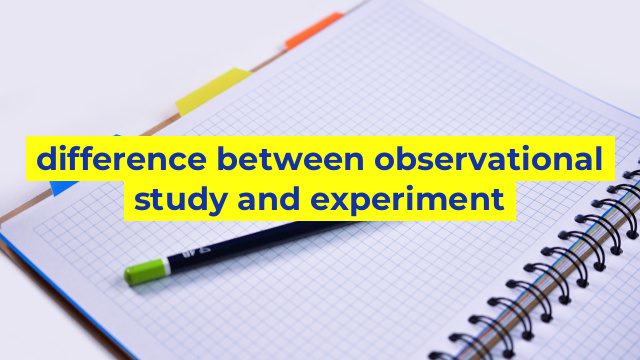Difference between an Observational Study and an Experiment – Which One is Better for Your Research?
When conducting research, there are two primary methodologies used: observational studies and experiments. While both can be effective methods for gaining insight into a particular topic, it is important to understand the differences between the two.
What is an Observational Study?
An observational study involves observing and collecting data on a group of individuals, without intervening or manipulating any variables. The purpose of an observational study is to simply observe and record data for the sake of analyzing it later. One of the most significant benefits of observational studies is their ability to capture a wide array of data in real-world environments.
Observational studies are widely used in medical research, social sciences, and public health. The key advantage of observational studies is that it allows researchers to observe natural behaviors in their subjects, and record data across a wide range of variables. The major downside of observational studies is that they can be prone to bias, as data may be influenced by unobserved factors such as unseen confounding variables.
What is an Experiment?
A scientific experiment, on the other hand, involves manipulating a variable and observing the effects on another variable(s). Experimentation typically involves dividing the sample population into groups, with one group receiving the manipulated variable (the “treatment” group), and the other group receiving none or a different “control” treatment.
Experimentation is most commonly used in the natural sciences to test hypotheses and theories. The control group is assigned to the original or current state, which isn’t manipulated, while the experimental group is assigned to the manipulated variable state. The difference between the two groups helps to discern the effect of the manipulated variable, accounting for the natural variation.
What are the Differences between an Observational Study and an Experiment?
The primary differences between an observational study and an experiment lie in the ability to manipulate the independent variable and randomize the control groups. Observational studies cannot manipulate the variable while experiments can, producing better cause-effect conclusions.
Here are some other key differences between the two:
- Observational studies can be quicker to perform, while experiments can take longer to set up due to the rigor in setting up experiments and randomization.
- Observational studies can produce a large quantity of real-world data without disrupting the natural state of things, while experiments can provide context or meaning to different interventions.
- In observational studies, there are often unobserved variables that can influence the results, but in experiments, the independent variable is controlled.
- Data collection and statistical analysis can be more subjective in observational studies, while experiment data collection and analysis follow a standard protocol.
Conclusion
In conclusion, both observational studies and experiments are effective research methods but are suited to gather different types of data. Observational studies are best when trying to capture real-world data, while experiments are best when trying to identify a particular variable’s influence. Understanding the pros and cons of each method will allow researchers to choose the right methodology to obtain the insights they need to move their research forward successfully.
Table difference between observational study and experiment
| Observational Study | Experiment |
|---|---|
| Type of study | Type of study |
| Researcher does not intervene or control any variables | Researcher manipulates an independent variable to observe the effect on a dependent variable |
| No random assignment of participants | Random assignment of participants to experimental and control groups |
| Used when unethical or impractical to conduct an experiment | Used to establish causal relationships between variables |
| Data is more open to bias and confounding variables | Data is less open to bias and confounding variables |
| Results are more difficult to generalize to a larger population | Results are more easily generalized to a larger population |

